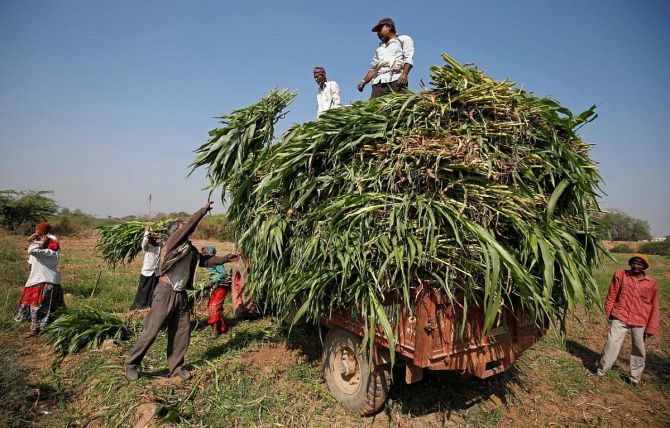'Once that happens, the three laws as they exist today will automatically become infructuous.'

"Now, he (Prime Minister Narendra Damodardas Modi) tells people 'I am your chowkidar'. This is what I am asking the chowkidar to do. We have given you votes; we are your employers; we chose you. Please listen to us and take back these three laws," Sardar V M Singh -- who claims he is still the national convener of the All India Kisan Sangharsh Coordination Committee even as a section of the AIKSCC says he has been removed from the post -- tells Prasanna D Zore/Rediff.com in the concluding part of the interview.
Has the AIKSCC undertaken any study that establishes that a guaranteed MSP will reduce farmers' indebtedness and benefit India's agriculture sector and people engaged in the sector?
Let me tell you something outright that makes waves wherever I say it.
Some people from the government have told me that we can't guarantee this because if we guarantee every grain that is produced in India, in these 23 crops, we will have to make provisions of about Rs 12 lakh crore (per year to purchase farmers' produce at MSP).
If the government is saying this, then it is accepting that every year farmers are losing Rs 12 lakh crore because they are not getting the MSP.
My argument is that the government should look at the brighter side (of this provision/expenditure).
If the government spends this kind of money, or if the farmers get this kind of money via MSP from private traders, then imagine the huge demand boost it will create in the rural economy.
It is a well-known fact that farmers don't keep a penny with them. They spend it all.
Imagine what Rs 12 lakh crore consumer boost could do to the Indian economy.
But does the government have that kind of money, given the sharp economic downturn, to pay this kind of money to the farmers?
This is the problem that I am facing with these chaps (representatives of the government) that they are telling me time and again that we don't have Rs 12 lakh crore to pay for every single crop that is there and purchase it at MSP.
My point is let the government pick only six per cent at MSP and let the rest go to the private players.
Say that (guarantee MSP through legislation) they (the private players) cannot buy for less than this (the MSP). End of story.
But why should the private players guarantee MSP? They believe in free market economics and if they start purchasing agricultural produce at MSP, won't it affect their profitability? They are accountable to their stakeholders, not to the government or farmers...
Let that be. You are right. They (the private players) are used to purchasing maize at (Rs) 700 (per quintal) and sell it for (Rs) 2000 (per quintal).
They want 300 per cent (exorbitant) profits. If the MSP (of maize) is Rs 1,760, you (the private players) buy it for Rs 1,760 and sell it for Rs 2,000.
Kya yeh jo private players hai, wohi paisa banate rahenge kya? Kisan ko apna lagat ka bhi daam nahi milega? (Should only the private players keep minting money? Shouldn't the farmer get back even his cost of production?)
Wouldn't this hit the pockets of the consumers who will ultimately pay more? Wouldn't pepped up MSP rates lead to high consumer and food inflation?
See, the proof of the pudding lies in eating.
Now, these three bills became law in June and in July the maize crop came up for purchase; paddy came for purchase in September, October. Maize, which has MSP of Rs 1,760, has been sold (to private players) for anywhere between Rs 700 and Rs 1,000 (per quintal).
Paddy, which gets farmers in Punjab and Haryana MSP of Rs 1,868, doesn't get the same rate for farmers in other parts of India.
It (paddy) sells between Rs 900 and Rs 1,000 in eastern UP, between Rs Rs 1,000 and Rs 12,000 in western UP; the same paddy sells for Rs 800 in Bihar.
If the farmers were to benefit from these three laws, as the government says to justify these laws, then wouldn't the farmers have got better prices for maize and paddy in open markets after these laws were made?
In fact, the MSP has decreased further (after these laws came into existence) proving that these laws have hurt the farmers more.
After these laws came into existence, the farmers are getting less than 50 per cent of the MSP rates (a case in point is paddy).
Does this government think the farmers will accept such a disastrous law? How are they protecting the farmers?
Let's talk about consumer inflation now.
The paddy, which these private players are buying for Rs 1,000-Rs 1,500 (average rate per quintal or Rs 10-Rs 15 per kilogram), the same paddy they are selling for Rs 35-40 per kilogram.
Now, these private players are making profits of Rs 20-Rs 30 per kilogram straight away. Now, if they buy at MSP, they would still be making profit of Rs 13-Rs 14 per kilogram.
If you (the private players) purchase paddy even at Rs 1,900 or Rs 2,000 per quintal (around MSP rates), and even then if you sell at Rs 35-40 per kilogram, you would still net Rs 10-Rs 15 per kilogram as profit (adjusting for costs of transportation, storage, etc). Where do you get this kind of profits?
But you (the private players) have tasted blood earning 200 per cent profits for all these years. Now that the government has got laws to protect the (interest of) corporates, the government must ensure protection for farmers also.
Is this government then offering more protection to corporates at the cost of farmers?
They (the private players) have always been making (huge profits) at the cost of farmers. They (the private players) have tasted blood all this while.
Then why is the government saying that these three laws will benefit the farmers?
Now, if you make a law that states that nobody can go to court; now they say you will get a law (the government is open to making this amendment) that will allow you to go to the SDM (Sub-divisional magistrate); SDM doesn't clear cases for three-four years.
Farmers can't be sitting outside SDM's office all the while spending money on such litigation.
All these things put together make these three laws very bad.
Now, he (Prime Minister Narendra Damodardas Modi) tells people 'I am your chowkidar'. This is what I am asking the chowkidar to do. We have given you votes; we are your employers; we chose you. Please listen to us and take back these three laws.
We want the MSP as per Swaminathan Commission recommendations; please give it to us.
Your demand, in that case, doesn't differ much from the section which has removed you as the national convener of the AIKSCC.
I don't care about these press releases. I have been working for farmers all my life. Tell me, all of them put together what have they got so far? I am not going into that argument at all.
I will give you another small example to put my point.
The moment you get a bill that guarantees MSP, a floor price, below which nobody (private players) can buy (from farmers) then these three laws become infructuous.
How will they become infructuous?
What is the dispute? The dispute is between (selling farmers' produce at the) APMCs and private mandis. When the private players come in, the farmers and traders will not go to APMCs. There are no taxes there (at private mandis).
If the farmers flock to the private mandis, then why will traders come to the APMCs where they have to pay taxes? So, they (the farmers) will be getting a lesser amount. Instead of Rs 1,760 for maize, they get Rs 700.
But if there is a law that states that nobody can buy maize for less than Rs 1,760, that it will be a crime, then it creates a level-playing field between private markets and APMC mandis and then these (three farm) laws will go for a toss.
This government always talks about one nation, one market (as in the case of GST). If this government makes provision for one nation, one MSP then why would a farmer from Meerut come to Delhi to sell his crops if he gets the same price in Meerut?
Let's talk about contract farming. Contract farming assures a farmer a rate better than what he otherwise gets by selling in open market or at APMC mandis.
If MSP is guaranteed, then why will a farmer go for contract farming?
If the MSP is guaranteed, then what happens to the contract farming law? The three laws will absolutely go to the bin.
That's what I mean by saanp bhi mar jaye aur lathi bhi na toote.
This will help everybody end this stalemate on a win-win note. But people who have very little knowledge of agriculture or the legal implications or ramifications of these three laws won't understand my point.
Let there be one nation, one MSP. Once that happens, the three laws as they exist today will automatically become infructuous.










